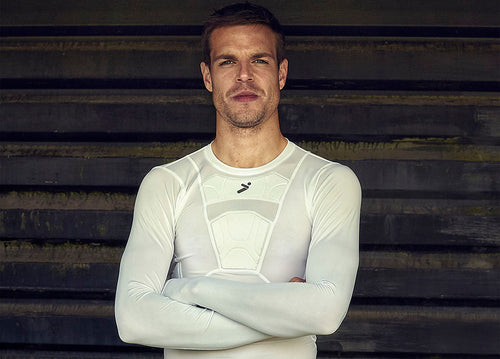
Whether you’re playing indoors or outdoors (depending on location), wintertime soccer can get uncomfortable. Heat injuries get a lot of press for their hazards, but cold weather can sabotage performance or even result in hypothermia in rare cases. This post will explore some simple tips for players to stay warm on the pitch.
Effects of cold temperatures on soccer players
A dip in temperature is usually not an issue for soccer players; it’s just uncomfortable, if anything. Of course, a cold snap or being new to a colder climate can make the discomfort a hindrance to performance and a risk factor for injury.
When cold temps are a problem for soccer players
- Reduces focus. Temperature extremes on either side of the thermometer affect cognition, cold temperatures included. Cold temperatures can distract a player, along with shivering and the body’s attempts to keep them warm. Of course, distractions can make players less alert, making sluggish passes or failing to put themselves in pockets that allow them to set up plays and finish them.
- Reduces muscle efficiency.When the body gets too cold, there’s a decrease in blood flow to the muscles, meaning they receive less oxygen as well. Poorly oxygenated muscles become rigid. That reduces explosiveness, and they’re more likely to succumb to sprains and strains.
- Hypothermia. A medical emergency, hypothermia can affect some players who experience cold weather. That happens when the body temperature falls far below a safe threshold and requires immediate treatment. Fortunately, it’s rare.
Generally, the first two problems are the problems most soccer players face when playing in cold weather. But they’re easily avoidable, namely, with the right strategies.
Cold weather protection for soccer players
Sometimes, cold temperatures are unavoidable or unexpected. True, simply checking a weather app will let you know how to dress, but sometimes temperatures can dip suddenly. Or indoor facilities may succumb to heating issues because of equipment failures or problems. That’s why it never hurts to be prepared for cold weather.
Layering
Dressing warmly is the most obvious starting point. You don’t need to overdo it because ninety minutes of game time is going to warm you up. Even goalkeepers are rarely motionless. But it doesn’t hurt to layer appropriately to ensure you’re not feeling a chill. You can add the following to stay warm: a base layer; an insulating layer; and a shell layer.
The base layer will likely be an undershirt, which you can keep for the entirety of the game. Your insulating layer will likely be a soccer jersey, soccer top, or training hoodie. Lastly, your shell layer might be a light jacket, which you’ll probably need to wear at certain moments, such as when you first arrive on the pitch or sit on the bench.
Opt for long sleeves and pants (especially if training)
You should throw on some long sleeves when warming up or doing a light training session. That’ll keep you warm until the moment you ramp up your gameplay, and you start to feel warm. Goalkeepers and players who won’t get as much playing (or training time) will benefit from long sleeves since they won't move as much.
Do dynamic warmups
Doing a light warm up will literally warm you up. Conditioning drills, such as the FIFA 11+ neuromuscular drills, activate your muscles to make them fire more efficiently, which is essential since cold weather makes muscles more rigid. They’ll be more ready for sudden and sustained movements. But, naturally, the movements will elevate your body temperature, making you feel warmer.
Stay hydrated
Hydration doesn’t only matter in hot temperatures—cold days also call for ample fluid intake. Dehydration reduces circulation. With less blood flow to your tissues, the lower your core body temperature will be, making you feel colder regardless of how warm you dress. So even when it’s cold, keep your fluid intake high.
Notes for coaches and organizers to keep players warm
Players are indeed largely responsible for dressing warmly during cold days. But when temperatures dip, coaches and league organizers also share a great deal of responsibility to keep players safe. The main ways they can contribute are in terms of managing players and playing conditions.
Coach’s responsibilities during cold days
- Seek out warm facilities (indoor). Of course, where possible, coaches and organizers should do their best to book playing time at indoor facilities that supply adequate heating and temperature controls. Naturally, these facilities will give players a suitable environment and protection against cold weather.
-
Be mindful of breaks and substitutions. Coaches must observe player performances if training or games happen outdoors. That may mean making substitutions where necessary or limiting the duration of training sessions.
Storelli gear
When it comes to soccer gear, we offer a selection of training gear that can keep players warm in cold weather. That includes both upper and lower body wear, and for both games and practices.
Upper body gear
- Training hoodies
- Training long sleeve mock tees
- BodyShield goalkeeper undershirts (for men and women)
-
ExoShield Gladiator jersey (has long sleeves)
Lower body gear
- BodyShield leggings (for men and women)
- Goalkeeper pants
When it comes to cold soccer weather, we’ve got you covered
Although cold weather can cause your performance to cool off, it’s rarely a match for prepared soccer players. To keep yourself in the best shape on cold days, be mindful of your gear and some pre-game habits.
When it comes to gear, we offer a selection of equipment to keep you warm and go the extra mile, such as wicking away sweat, so you don’t feel cold and wet. And, of course, some gentle warm ups before a game will keep your temperature balanced. A dip temperature doesn’t have to stop you from rising to whatever challenges you face on the pitch.
Need to stay warm while playing soccer in the colder months? Browse our training gear, soccer tops, and pants selection to shake off the cold!























